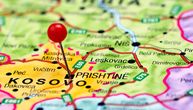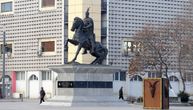We'll stick to what's agreed, problem is Pristina's not doing it: Dacic on continuation of dialogue
Dacic said that it was very important for Pristina to first say whether it would adhere to the commitments taken under the Brussels agreement or whether it believed that everything that has been signed is not valid
First Deputy Prime Minister and Minister of Foreign Affairs of the Republic of Serbia Ivica Dacic assessed that it is not up to the EU representatives to determine the outcome of the dialogue between Belgrade and Pristina in advance and stressed that dialogue with Pristina is vital for Serbia in the coming period. Lajcak, the EU special representative for dialogue between Belgrade and Pristina, has both positive and negative sides.
"It is positive that he knows the situation well and that he comes from a country that has not recognized Kosovo," Ivica Dacic told Pink TV and added that it is unrealistic to expect Serbia to accept Kosovo's independence because of the promisethat it would join the EU in the coming decades.
"They can say what they want, but the decision on whether we agree or not is made by Serbia. That is why it's important for Serbia to be politically stable and for elections to take place in a democratic atmosphere," said the head of Serbian diplomacy.
Dacic said that it was very important for Pristina to first say whether it would stick to the commitments taken under the Brussels agreement or whether it believed that everything that has been signed is not valid.
He pointed out that the position of the Americans on taxes (on Serbian goods imposed by Pristina) has been clear so far, that they must be abolished, but there there had been a lack of determination in expressing it, which was then introduced by special envoy Richard Grenell.
"We are not asking for concessions, we will adhere to everything that's been agreed, but the problem is that Pristina is not taking any action, the Brussels agreement was signed in 2013, and now they will not say whether they will stick to it or not," stressed Dacic.
He added that the United States has not changed its position, but that the administration has changed, and the current one of Donald Trump has a slightly more flexible position on reaching a compromise, unlike the previous Democratic one, for which the Kosovo issue was done deal.
"Democrats consider the issue of Kosovo resolved, while the Trump administration believes that it has not been resolved and that a compromise should be reached. And we contributed to that because we managed to withdraw recognitions of Kosovo and strengthen relations with some countries, such as Germany," said Dacic.
The minister of foreign affairs says that there has always been a distinct geographical and demographic asymmetry in relations with the United States, as well as an asymmetry of power, but even in that relationship, Serbia and the Serbian people have shown that it is possible for not a very a big country to be a US ally.
Commenting on the possibility of Serbia suspending its lobbying campaign for withdrawals of recognition of so-called Kosovo, Dacic stated that Serbia will continue with these activities as long as lobbying in favor of Kosovo's membership in international organizations continues. The head of Serbian diplomacy said that it was in Serbia's interest, primarily economic, to go to the EU, if it is able to protect state and national interests.
"We should not go to the EU at the cost of giving up Kosovo, recognizing Kosovo's independence or abolishing the Serb Republic," said Dacic.
Montenegro
He reiterated that he considers Montenegro's decision not to allow Serbian citizens to enter that country to be political.
"Since June 1, citizens and residents of countries with less than 25 coronavirus cases per 100,000 inhabitants can enter Montenegro. Besides everything else that exists as a problem, you now have additional deterioration in Montenegro over the possibility of someone entering the country. And calculations are made that no one else is using. They invented certain numbers, allowed in citizens of Kosovo, where there was no major testing for coronavirus," said the minister of foreign affairs and assessed that Belgrade does not interfere in the internal affairs of Montenegro, something Podgorica accuses Serbia of.
"Criticisms is reaching us that we are too peaceful and are not reacting as strongly as we should," Dacic added.
(Telegraf.rs)

